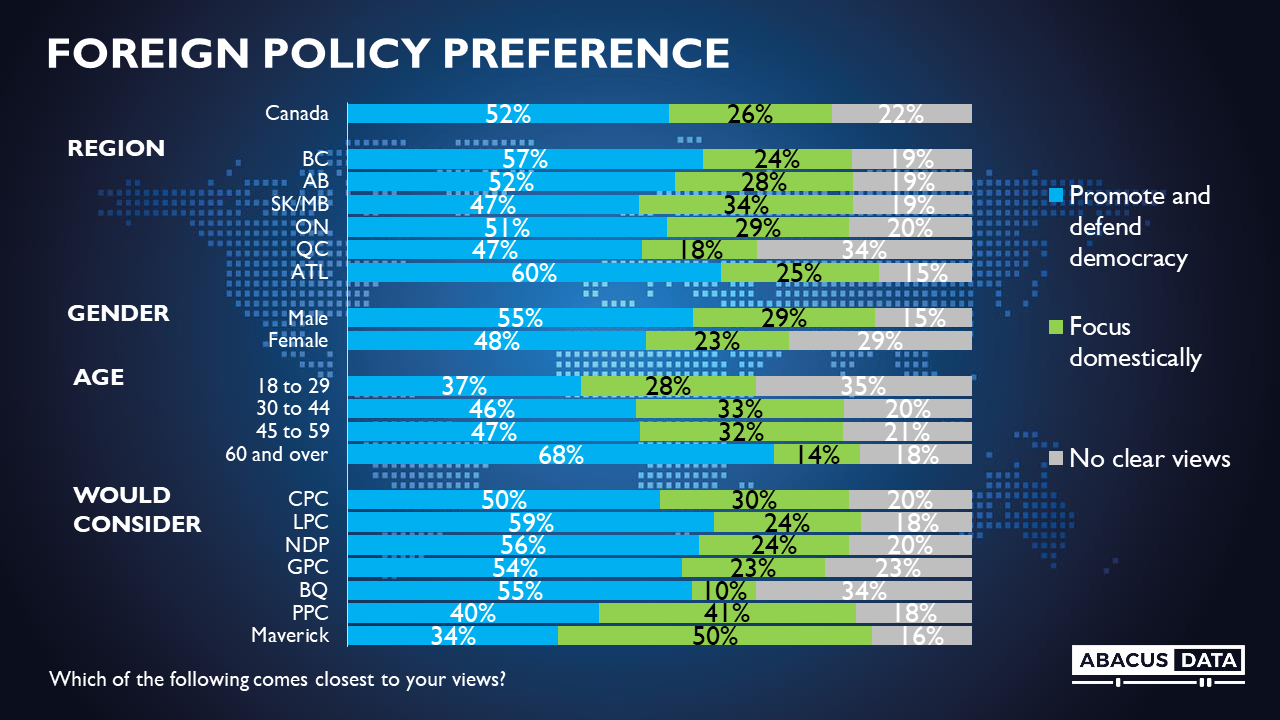Do Canadians Think Democracy Is in Decline Globally?
May 25, 2022
The year got off to a terrifying start with the invasion of Ukraine, a democracy, by Russia, an authoritarian regime, just a year after the US Capitol was stormed by those who wanted to prevent the peaceful transition of power from Donald Trump to Joe Biden. In Hungary, just a few weeks ago, autocrat Viktor Orbán was comfortably re-elected, despite every opposing party uniting forces as a coalition to try and defeat him.
These events, and many more, raise the question; is democracy on the decline globally? Objectively, the answer is clearly yes. But does Canadian public perception match this reality and do people think it matters to their lives?
In a recent national survey of 1,500 Canadian adults (conducted from May 3 to 6, 2022) we explored public perceptions about democracy globally and what role Canada can play in defending and promoting it around the world.
GLOBAL DECLINE IN DEMOCRACY
Almost half of Canadians (46%) believe that democracy around the world is retreating and declining, while 19% think it is advancing. Many, however, are not sure (34%). Those who are not sure share a broader isolationist world view that leads them to be disengaged with world affairs.
Younger Canadians (those under 45 years) are the most optimistic that democracy is advancing. Men are also slightly more optimistic than women. Those with more formal education are less likely to be unsure of what is happening globally to democracy but do recognize the global decline.

The decline in democracy is understood to matter to those who see the decline. One in four (24%) Canadians who recognizes that democracy is retreating and declining think this decline will have a big impact on their life. Few people (5% not at all) don’t think the democratic decline will impact them at all. However, given that most people think the impact will be limited, it’s likely that the direct link between democracy globally and their lives here in Canada are only tenuously understood.

Perceptions of the state of democracy around the world are strongly tied to overall perceptions of the world. When we ask whether the world is heading in the right direction or off on the wrong track, Canadians are twice as likely to say it is on the wrong track if they feel that democracy is retreating and declining versus those who feel democracy is advancing and growing. Canadians who think the world is off on the wrong track are much less likely to think democracy is advancing.

CANADA’S ROLE IN PROMOTING DEMOCRACY
While Canadians are pessimistic about the spread of democracy around the world, they view the promotion of democracy and human rights as the top source of pride in Canada’s foreign policy. Our armed forces and defence capabilities are the greatest source of pride for the fewest Canadians (7%).

When given the choice of working with allies to promote and defend democracy or focusing on strengthening their own country, Canadians choose by a 2 to 1 margin an internationalist approach. One in four (26%) would not get involved in international efforts to prevent the spread of authoritarianism and 22% don’t have a clear view either way.
Younger Canadians are less likely than their older counterparts to want to promote and defend democracy, but this is mostly because they are much less likely to have a clear view of the trade-off (35%). Those 60 years of age and older are the most committed to promoting and defending democracy (68%).
Ideological self-identification is strongly associated with the preferred approach to promoting democracy around the world, with those on the left much more supportive. Reflecting this, those who are open to voting Liberal and NDP are the most likely to adopt a pro-democracy posture. Those open to voting for the People’s Party of Canada and the Maverick party are the least likely to support promoting and defending democracy around the world.


UPSHOT
Many Canadians understand that democracy around the world is in decline but this is still a minority viewpoint. More work needs to be done to not only define the problem, make it salient, but also make it relevant for people. It is easy to look at this finding and be discouraged. The silver lining in these results is the strong commitment and desire among Canadians to be active promoters of democracy around the world.
METHODOLOGY
The survey was conducted with 1,500 Canadian adults from May 3 to 6, 2022. A random sample of panelists were invited to complete the survey from a set of partner panels based on the Lucid exchange platform. These partners are typically double opt-in survey panels, blended to manage out potential skews in the data from a single source.
The margin of error for a comparable probability-based random sample of the same size is +/- 2.6% 19 times out of 20.
The data were weighted according to census data to ensure that the sample matched Canada’s population according to age, gender, educational attainment, and region. Totals may not add up to 100 due to rounding.
This survey was paid for by Abacus Data Inc.
Abacus Data follows the CRIC Public Opinion Research Standards and Disclosure Requirements that can be found here: https://canadianresearchinsightscouncil.ca/standards/
ABOUT ABACUS DATA
We are the only research and strategy firm that helps organizations respond to the disruptive risks and opportunities in a world where demographics and technology are changing more quickly than ever.
We are an innovative, fast-growing public opinion and marketing research consultancy. We use the latest technology, sound science, and deep experience to generate top-flight research-based advice to our clients. We offer global research capacity with a strong focus on customer service, attention to detail, and exceptional value.
We were one of the most accurate pollsters conducting research during the 2021 Canadian election following up on our outstanding record in 2019.
Contact us with any questions.
Find out more about how we can help your organization by downloading our corporate profile and service offering.




